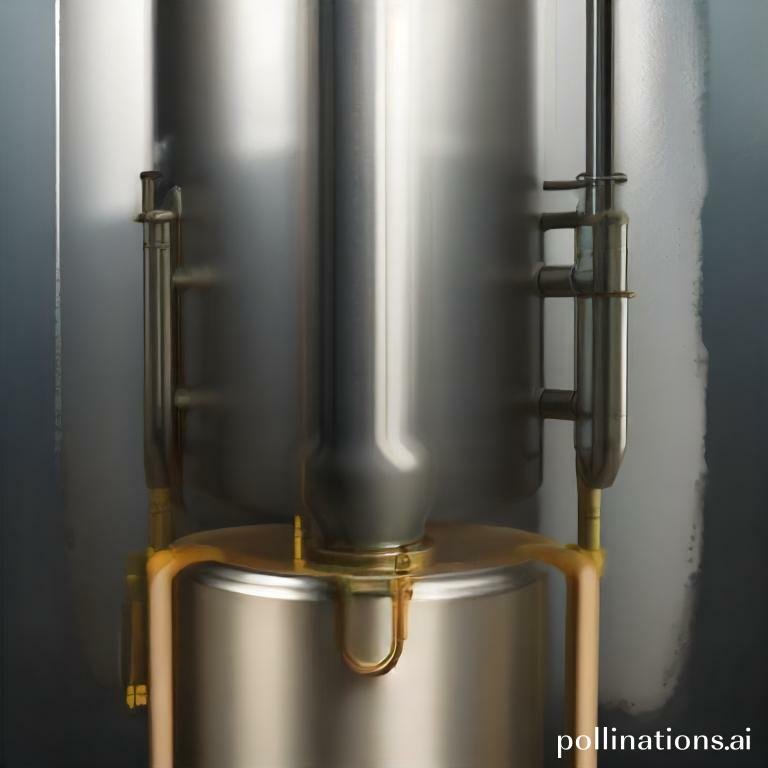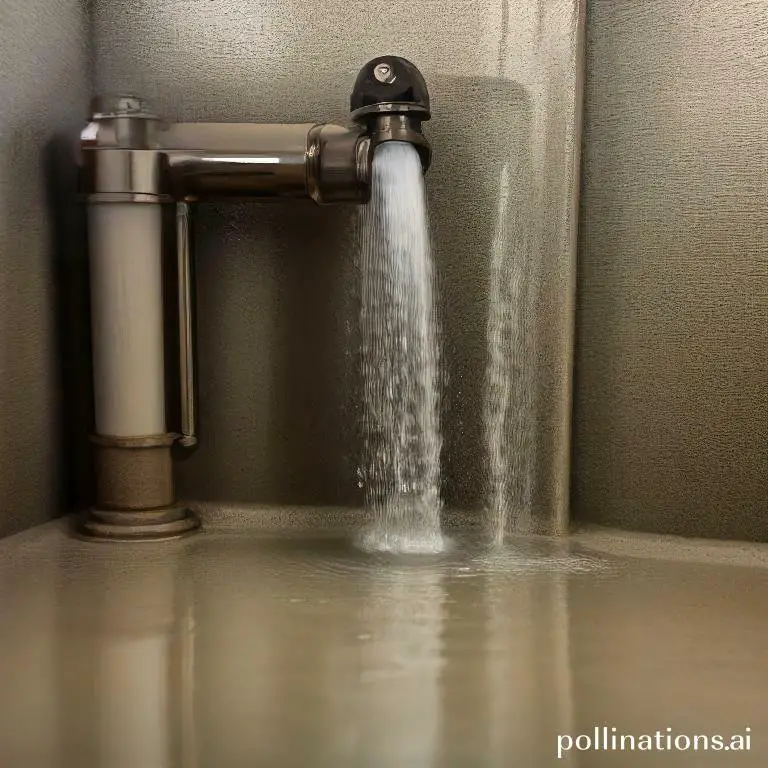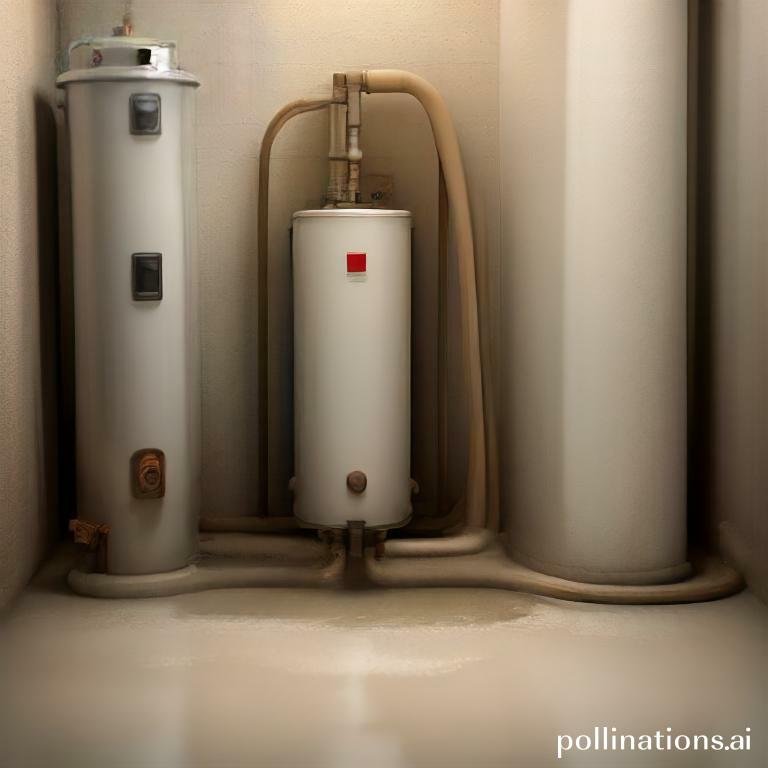
II. Regular maintenance and inspection of your water heater and pipes can help minimize the risk of leaks.
III. Simple measures such as installing a drip pan and ensuring proper pipe connections can also prevent leaks and save you money in the long run.
Water heater pipe leaks can cause significant damage and inconvenience. In this guide, we will navigate effective methods to minimize these leaks and ensure the longevity of your water heater system.
We will discuss proper installation techniques, regular maintenance routines, and common signs of potential leaks to watch out for. By implementing these strategies, you can save money on repairs and enjoy a reliable supply of hot water without the worry of unexpected pipe leaks.
Let’s get started!
Discerning the Causes of Water Heater Pipe Leaks
1. Age of the water heater
One of the primary causes of water heater pipe leaks is the age of the water heater itself. As water heaters get older, the pipes can deteriorate and develop cracks or leaks. This is especially true for older models that may have been in use for several years.
2. Poor installation or maintenance
Improper installation or lack of regular maintenance can also contribute to water heater pipe leaks. If the pipes are not installed correctly or if they are not maintained, it can lead to stress on the pipes, causing them to leak. Regular inspections and maintenance can help prevent these issues.
3. High water pressure
High water pressure can put excessive strain on water heater pipes, leading to leaks. When the pressure inside the pipes becomes too high, it can cause weak points in the pipes to rupture or develop leaks. Installing a pressure regulator can help control water pressure and prevent leaks.
4. Corrosion and rust
Over time, water heater pipes can corrode and develop rust, especially if they are made of metal. Corrosion weakens the pipes and makes them more prone to leaks. Regular inspection and addressing any signs of corrosion can help prevent leaks and extend the lifespan of the pipes.
5. Hard water
Hard water, which contains high levels of minerals like calcium and magnesium, can contribute to the development of leaks in water heater pipes. These minerals can build up inside the pipes, leading to blockages and increased pressure, ultimately causing leaks. Using a water softener or descaling the pipes can help reduce the impact of hard water on pipe integrity.
| Cause | Description |
|---|---|
| Age of the water heater | The older the water heater, the higher the likelihood of pipe leaks due to deterioration. |
| Poor installation or maintenance | Improper installation or lack of maintenance can stress the pipes and lead to leaks. |
| High water pressure | Excessive water pressure can cause weak points in the pipes to rupture or develop leaks. |
| Corrosion and rust | Corrosion weakens the pipes over time, making them more susceptible to leaks. |
| Hard water | Mineral buildup from hard water can lead to blockages and increased pressure, resulting in leaks. |
Signs of Water Heater Pipe Leaks
Water heater pipe leaks can be a common issue that homeowners face. It’s important to be aware of the signs to detect any leaks early and prevent further damage. Here are some key signs to look out for:
1. Visible water damage
One of the most obvious signs of a water heater pipe leak is visible water damage. This can manifest as dampness or wet spots around the water heater or nearby walls and floors. If you notice any discoloration, stains, or mold growth, it’s a clear indication of a leak that needs immediate attention.
2. Strange noises from the water heater
Unusual noises coming from your water heater can also be a sign of a pipe leak. Hissing, popping, or banging sounds may indicate that water is escaping from the pipes and coming into contact with the heating element. If you hear any of these sounds, it’s important to investigate the issue further.
3. Discolored water
If you notice discolored water when you turn on the hot water tap, it could be a sign of a water heater pipe leak. Rusty or muddy water can indicate that the pipes are corroded and leaking. It’s important to address this issue promptly to avoid further damage to your plumbing system.
4. Low water pressure
A sudden decrease in water pressure can be a sign of a water heater pipe leak. Leaking pipes can cause a drop in water pressure, making it difficult to perform everyday tasks like showering or doing the dishes. If you’re experiencing low water pressure, it’s important to have your pipes inspected.
5. Higher than usual energy bills
A water heater pipe leak can lead to increased energy consumption, resulting in higher than usual energy bills. Leaking pipes cause the water heater to work harder to maintain the desired temperature, leading to increased energy usage. If you notice a significant spike in your energy bills, it’s worth investigating for potential leaks.
Steps to Prevent Water Heater Pipe Leaks
Water heater pipe leaks can cause significant damage and inconvenience. To ensure the longevity of your water heater and prevent leaks, follow these essential steps:
1. Regular maintenance
Regular maintenance is crucial for preventing water heater pipe leaks. Schedule annual inspections with a professional plumber to check for any signs of wear and tear. They can identify potential issues early on and make the necessary repairs or replacements.
2. Install a water softener
Hard water can cause mineral buildup in your pipes, leading to corrosion and leaks. Installing a water softener can help prevent this. A water softener removes minerals like calcium and magnesium from the water supply, reducing the risk of pipe damage and leaks.
3. Install a pressure regulator valve
High water pressure can put excessive strain on your water heater pipes, increasing the likelihood of leaks. Installing a pressure regulator valve can help control and maintain optimal water pressure, reducing stress on the pipes and minimizing the risk of leaks.
4. Replace old or damaged pipes
Over time, pipes can deteriorate or become damaged, increasing the chances of leaks. Inspect your water heater pipes regularly and replace any old or damaged sections promptly. This proactive approach can prevent leaks and ensure the overall integrity of your plumbing system.
5. Insulate pipes
In colder climates, pipes are susceptible to freezing, which can cause them to burst and lead to leaks. Properly insulating your water heater pipes can protect them from freezing temperatures. Use insulation sleeves or tapes to cover exposed pipes and prevent water damage.

What to Do in Case of Water Heater Pipe Leaks
In the unfortunate event of water heater pipe leaks, it is crucial to take immediate action to minimize damage and ensure the safety of your home. Follow these steps to effectively handle the situation:
1. Turn off the water supply
As soon as you notice a water heater pipe leak, locate the main water shut-off valve and turn it off. This will stop the flow of water and prevent further damage to your property.
2. Turn off the power supply
For electric water heaters, turn off the power supply at the breaker box. If you have a gas water heater, turn off the gas supply using the shut-off valve located near the unit. This step is essential to avoid any electrical or gas-related hazards.
3. Call a professional plumber
Contact a licensed plumber who specializes in water heater repairs. They have the expertise and necessary equipment to assess the situation, fix the leak, and ensure that your water heater is functioning properly.
4. Document the damage for insurance purposes
Before the plumber arrives, take photos or videos of the water damage caused by the pipe leak. This documentation will be valuable when filing an insurance claim to cover the repair costs or any resulting property damage.
5. Consider replacing the water heater
Depending on the extent of the damage and the age of your water heater, your plumber may recommend replacing the unit. Newer models are more energy-efficient and can help save on your utility bills in the long run.
| Step | Action |
|---|---|
| 1 | Turn off the water supply |
| 2 | Turn off the power supply |
| 3 | Call a professional plumber |
| 4 | Document the damage for insurance purposes |
| 5 | Consider replacing the water heater |

Benefits of Preventing Water Heater Pipe Leaks
Water heater pipe leaks can cause significant problems and expenses. By taking preventive measures, you can enjoy various benefits:
1. Saves money on energy bills
When water heater pipes leak, the system has to work harder to maintain the desired temperature. This leads to increased energy consumption and higher utility bills. By preventing leaks, you can ensure that your water heater operates efficiently, saving you money in the long run.
2. Prevents property damage
Water leaks from the pipes can cause extensive damage to your property. They can result in water stains, mold growth, and even structural issues if left unaddressed. By taking proactive measures to prevent pipe leaks, you can protect your home from costly water damage repairs.
3. Extends the life of the water heater
Leaks in water heater pipes can accelerate the deterioration of the system. When pipes leak, it puts additional stress on the water heater, leading to premature wear and tear. By preventing leaks, you can extend the lifespan of your water heater and avoid the need for costly replacements.
4. Ensures constant hot water supply
Water heater pipe leaks can disrupt the flow of hot water in your home. This can be inconvenient, especially during cold winter months when you rely on hot water for various activities. By preventing leaks, you can ensure a consistent supply of hot water, providing comfort and convenience for you and your family.
5. Peace of mind
Knowing that your water heater pipes are in good condition and leak-free can give you peace of mind. You can have confidence that your system is functioning optimally, reducing the risk of unexpected breakdowns or emergencies. This peace of mind allows you to focus on other aspects of your life without worrying about water heater issues.
| Benefit | Description |
|---|---|
| Saves money on energy bills | Preventing leaks reduces energy consumption and lowers utility costs. |
| Prevents property damage | Avoid costly repairs from water damage caused by leaks. |
| Extends the life of the water heater | Leak prevention helps maintain the longevity of the water heater system. |
| Ensures constant hot water supply | Preventing leaks ensures a consistent flow of hot water throughout your home. |
| Peace of mind | Knowing your water heater is leak-free provides peace of mind and reduces worries. |
Bottom Line
Water heater pipe leaks can cause significant damage to your home and lead to costly repairs. To minimize the risk of leaks, it’s important to properly maintain your water heater and its pipes. Regularly inspect the pipes for signs of wear and tear, and replace any damaged or corroded sections immediately. Consider installing a water alarm to alert you to any leaks before they cause extensive damage. Additionally, make sure your water heater is installed by a licensed professional and meets all local building codes. By taking these steps, you can help prevent water heater pipe leaks and protect your home from water damage.
Remember, prevention is key in terms of water heater pipe leaks. Don’t wait until it’s too late to take action. Stay vigilant and proactive in maintaining your water heater and its pipes to avoid costly and inconvenient leaks.
Read More:
1. Addressing Leaks In Electric Water Heaters
2. Water Heater Leak Maintenance Checklist
















